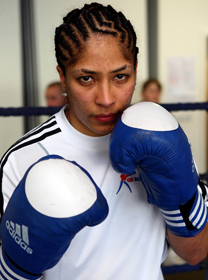Still packing a punch - Hannah Beharry

By Colin Babb
As a young schoolgirl, Hannah Beharry was full of energy and passionate about a wide variety of sports.
However, the idea of becoming a female boxing pioneer could not have been further from her imagination.
Hannah was born and raised in West London with a Guyanese father and a Trinidadian mother, and with ancestral roots in Africa, India and Scotland.
She lived in a household with five brothers who, as she told Caribbean Intelligence©, “had me playing basketball, football, a bit of rugby, and cricket, which for us was a big Caribbean sport. I was always out and didn’t really watch a lot of TV, because what entertained us was going out and playing sport.”
Hannah progressed to representing her primary and secondary schools in athletics, netball, hockey and football.
When she left school, she attended a local youth centre to continue playing sport. It was at this youth centre that she received her completely unexpected introduction to boxing.
As Hannah recalls: “I was playing football when one of the youth workers called me over, said I might have the skills for boxing and that I should give it a try.
“It was totally random! I’d never seen any female boxers on TV. I knew all about Muhammad Ali, Mike Tyson, and other fighters, but I’d never seriously acknowledged boxing as a sport for me.
“Because the gym he recommended was only 20 minutes away from my house, I thought I’d go and find out more about what he was saying.
“I walked in and had a conversation with the head coach, but he was adamant that women should not be able to box in his gym.”
Hannah explains: “He also said that he would try and blacklist me from other gyms. I tried to go to other gyms but they wouldn’t accept me, and some people were quite horrible to me.”
In 2000, Hannah met an Iranian trainer who had coached the Iranian Olympic boxing squad.
Hannah quickly excelled after a period of regular training sessions with him, and began to receive more recognition after winning her first competitive fight.
“I had my first proper contest at the age of about 16 and a half, and it lasted three out of the four rounds. I stopped my opponent in the third round and she retired after the fight,” she told Caribbean Intelligence©.
“She was a police boxer in her 30s, and that was it for her, and I didn’t really know why! After I won the fight, I felt on top of the world and couldn’t believe it. Everybody soon wanted to know who I was and things started to change.”
During the start of her journey through the developing British female boxing scene, Hannah found it difficult to receive support from some of her family.
However, the level of support and appreciation, which began as a trickle, quickly became a flood as Hannah became more successful.
“My family didn’t really support me at first, and they weren’t positive about the experience, which was understandable,” says Hannah.
“My big brother was really supportive and always has been throughout my career. But my mum didn’t think boxing was ladylike. She just wanted me to cook proper West Indian dishes,” she chuckles. “Which, to an extent, I do!
“Most of the older West Indian people I spoke to felt the same way. But it didn’t really hurt me or harm me because I knew what to expect, and I understood why they had those opinions. But when I started to get into the newspapers, and became the British [female at 48 kg] champion, opinions quickly changed and I started to get more support.”
Hannah told Caribbean Intelligence©: “Back in Trinidad, the older generation of my family were OK about it. They didn’t really talk about boxing with me, but they were proud of the idea of me being a female boxer in the UK.
“The younger generation understood it a bit more. They were more intrigued and wanted to talk about it, because they were very excited by it all.”
Hannah’s boxing schedule become more demanding as her determination to fulfil her ambition increased. She travelled across the globe to attend training camps, became one of the first female boxers to represent England and Great Britain, boxed in international championships, and picked up medals and tournament wins on her travels.
Some of the countries she competed in include Hungary, India, Poland, Russia, the Seychelles and Thailand.
In the Caribbean, she boxed in Barbados, which hosted the 2010 World Championships for Elite Women boxers, as well as Cuba, Guadeloupe and Jamaica.
Hannah shared her fond memories of training and boxing in Guadeloupe with Caribbean Intelligence©.
“I had to be professional when I travelled, because I was in these countries to work. So when I was in the Caribbean, I had to avoid all the temptations. I couldn’t eat the food I wanted to eat, drink, socialise and have fun.
“In Guadeloupe, the people were brilliant, the head coach was awesome, and I got looked after very well. I met a Guadeloupean politician the night before my fight and he offered me a glass of rum.
“I told him that I didn’t want to drink it, and hoped I wasn’t being rude, but he didn’t understand it. So I had to drink it!”
In 2012, Hannah suffered disappointment when she was unable to compete in that year’s Olympic Games because of a shoulder injury.
As Hannah sadly recalls: “It happened midway through 2011, during the World Championships, which was roughly a year before the Olympics. I still went ahead with my campaign to get to the Olympics, but realised a couple of months before the Olympics that I wasn’t going to make it.”
During the London 2012 Olympics, Nicola Adams, another boxer of Caribbean descent, rapidly became the public face of British female boxing.
Nicola became the first female boxer to win a gold medal in an Olympic Games. Nicola and Hannah have been friends and competitors for many years, and Hannah warmly appreciates the role Nicola has played in “taking boxing in the UK to a whole new level”.
“I’m great friends with Nicky [Nicola] because we trained together, or alongside each other, in training camps for nearly nine years. When I sparred against Nicky it was always on and off with us. I’d have a good day and then she’d have a good day. It was always competitive between us and we boxed off twice and I beat her on both occasions, but they were both UK championships.
“Nicky is the face of GB boxing and there is more money in female boxing now. People respect us a lot more, and boxing is one of the fastest growing sports in the UK and in developing countries, including the Caribbean. Women are also beginning to understand that this is now a whole new avenue for them to go through.”
Hannah retired from competitive boxing after the London 2012 Olympics, but still maintains a disciplined training regime of two sessions a day.
“Once you’ve been an athlete, keeping fit doesn’t come into your head,” Hannah insists.
“You just want to keep pushing yourself. If I find my muscles are getting used to a work out that I’ve done twice in a week, I need to change it.”
Alongside her twice daily gym workouts, Hannah works for various companies and organisations.
One of them is Sky, the broadcasting and telecommunications company, who she describes as helping her to “overcome retirement and integrate into normality”.
Hannah works as an athlete mentor for the Sky Academy’s partnership with the UK’s Youth Sport Trust.
One of the internationally recognised sportsmen working for the Sky Academy is David Beckham. Jessica Ennis-Hill and Darren Campbell, who are both British medal-winning athletes with Caribbean heritage, also work as mentors for the Academy.
“The Sky Academy is aimed at 11- to 16-year-olds in the UK, and it’s all about getting young people motivated, getting them to gain confidence, and helping them to develop the keys to success,” Hannah told Caribbean Intelligence©.
“As elite athletes and ambassadors, we travel around the country, tell our stories, deliver presentations to young people from a variety of backgrounds and work with them.”
It was no surprise to hear that Hannah is often asked by women how they can get involved in boxing. So Caribbean Intelligence© asked Hannah to tell us what she would say to women who want to take up the sport.
“You’ll never get thrown straight into the ring in a boxing club, because you’ll learn all the basics, and coaches are usually much more sensitive towards females. As soon as you’re good enough you’re going to get hit, and then you’ll see this is where it really matters.
“So, are you going to walk out? Or are you going to come back at it? Nine times out of 10 a girl will come back and stick at it.
“The Olympic Games will come round again [in 2016 in Rio de Janeiro], and with the push for female activity sport with This Girl Can [a campaign developed by Sport England to get women and girls moving, regardless of shape, size and ability], the time for them is now.”
Towards the end of her chat with Caribbean Intelligence©, Hannah shared her future plans to relocate to the Caribbean, “probably in the next five years”.
However, her more immediate plan this year is to take a break in the Caribbean from her hectic schedule.
“I’m so busy that I don’t have time to sit down and relax. So I want to go to St.Vincent on holiday this year to unwind and while I’m in the Caribbean, I might pop over to Trinidad to see my family,” she told Caribbean Intelligence©.
“But knowing me, I’ll need to find a gym to work out and go for some runs on the beach.”
Click here for other stories on Caribbean People Abroad.
Related Links



